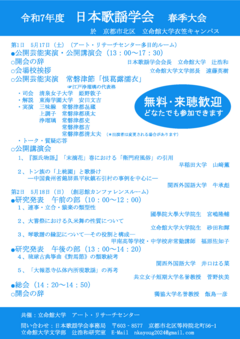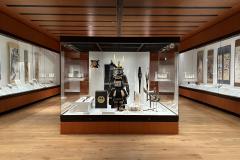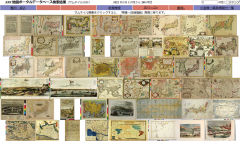-
Notes:
The Association of Japanese Ballads and Songs (Nihon kayo gakkai) will hold its Spring 2025 meeting at the Ritsumeikan University Kinugasa campus.The two-day event includes performing arts demonstrations, lectures, and research talks open to the public. Free to attend; no registration necessary.
Date: Saturday, May 17 and Sunday, May 18, 2025
Place: Ritsumeikan University Kinugasa Campus (56-1 Toji-in Kitamachi, Kita-ku, Kyoto)
※Please note that the building (classroom) is different for the first and second days.Day 1 : May 17 (Sat)
Public Performing Arts Demonstration and Lectures (13:00-17:30)
Location: Art Research Center, Multipurpose StudioDay 2:May 18 (Sun), Research Presentations
Location: Conference Room, SoshikanFor more information, please see the Nihon Kayo Gakkai homepage: 令和7年度春季大会(zoom併用開催)
Please direct inquiries to the Nihon Kayo Gakkai at: Email: nkayoug2024@gmail.com[イベント情報]April 23, 2025(Wed)The 146th International ARC Seminar will be held as a webinar on Wednesday, April 23, from 18:30 JST.
The program is as follows:
Speakers: Dr. Hiroyuki YAMAUCHI (Associate Research Professor, Kinugasa Research Organization, Ritsumeikan University)
Topic: 'The Plan and Trial Investigations for the ARC "Research Metaverse": Based on Applications for Geography Education Studies'
Date: Wednesday, April 23, 2025, 18:30 - 20:00 JST
Participation: online via Zoom, free of charge (affiliated parties only, no reservation required)
*This webinar is open to everyone, and non-ARC members are invited to participate via YouTube.
We are pleased to announce the Call for Manuscript Submissions for the Art Research Center's journal ART RESEARCH vol.26-2
As an academic journal specializing in arts and culture, the purpose of ART RESEARCH is to widely publicize the results of the research projects and activities conducted by the Art Research Center (ARC), Ritsumeikan University, and its partner institutions and collaborative researchers.
Since its establishment in 1998, the Art Research Center (ARC) has been selected for several national grants as a center of excellence for research in culture, art, and information science. From FY2019, the center assumed the role as the International Joint Digital Archiving Center for Japanese Art & Culture (ARC-iJAC) upon its accreditation by the MEXT as an International Joint Usage/Research Center. The ARC is highly regarded as a leading hub for the digital archiving of Japanese art and culture.
Our online journal will be published several times a year, and at the end of the fiscal year, a print booklet compiling all contributions will be distributed.
We look forward to receiving your manuscript.
Journal title: ART RESEARCH, vol. 26
Format: A4 size, two columns for both horizontal and vertical writing
Publication dates: Three times per year (vol. 26-1 late July 2025, vol. 26-2 early November 2025, vol. 26-3 late February 2026) (tentative)
Contents: Research papers and research notes related to culture, art, and information science (research reports, introduction of materials, technical notes, etc.). Those that match the theme of a research project related to the Art Research Center are particularly welcome.【Eligibility for Submission】
Members of Ritsumeikan University (including graduate students) and other, researchers participating in research projects conducted by the Art Research Center (ARC) and who have been approved by the Editorial Board are eligible to submit manuscripts for publication. Undergraduate students are not allowed to submit manuscripts on their own.
【Manuscript Submission Guidelines】
Manuscript Submission Guidelines
How to apply
Only complete manuscripts will be accepted.
Please send us your manuscript and the required information via e-mail by the due date.
The manuscripts will be reviewed by the Editorial Board and notifications of acceptance / rejection will be sent upon review.
Application documents
1. Manuscript
2. Indication of the type of manuscript (e.g. research paper, research note)
3. Address and telephone number
Contact journal@st.ritsumei.ac.jp
※Please state "Art Research Manuscript Submission" in the subject line
Deadlines
[vol. 26-1] April 20 (Sun), 2025, 24:00 JSTdeadline has passed[
vol. 26-2] June 13 (Sun), 2025, 24:00 JSTdeadline has passed[vol. 26-3] October 26 (Sun), 2025, 24:00 JST
※Should you have any difficulties submitting your work via e-mail, please contact the Art Research Center office in advance.
※For manuscripts other than research papers and research notes, please contact the Art Research Center office.
※Please note that your personal information will not be used for any purpose other than the editing of Art Research.
Schedule
[vol. 26-1]
April 20 (Sun), 2025 Deadline for manuscript submissiondeadline has passedLate April 2025 Notice of acceptance/ rejectionApril -- June 2025 Peer review, rewriting and proofreading※2 peer reviewersLate July 2025 Online publication of journal
[vol. 26-2]
June 13 (Sun), 2025 Deadline for manuscript submissiondeadline has passedMid-July 2025 Notice of acceptance/ rejection
August -- Mid-October 2025 Peer review, rewriting and proofreading
※2 peer reviewers
Early November 2025 Online publication of journal
[vol. 26-3]
October 26 (Sun), 2025 Deadline for manuscript submission
Early November 2025 Notice of acceptance/ rejection
Early November 2025 -- Mid-February 2026 Peer review, rewriting and proofreading
※2 peer reviewers
February 2026 Online publication of journal (scheduled)
Late March 2026 Publication of print booklet (scheduled)
【Other remarks】
Please contact us if you would like to receive back issues of the journal. If you wish to receive them by post, please understand that you will bear the postage.
For more information, please contact:
Art Research Center Office
TEL: +81-75-466-3411 ( ext. 511-2931)
FAX: +81-75-466-3415 (ext. 511-2935)
E-mail: journal@st.ritsumei.ac.jp
* Please state "Journal Inquiry" in the subject line.
[イベント情報]March 12, 2025(Wed)The article in the Ritsumeikan University's research magazine 'Radiant' introduced the international joint research projects, led by Prof. Ryo Akama, Director of ARC, to create a global consortium focused on preserving and researching Japanese cultural materials. The projects aim to build upon existing collaborations with institutions across North America, Europe, and Japan to strengthen and expand these networks worldwide.
For more details, click here <External website
https://en.ritsumei.ac.jp/research/radiant/global/impact/?id=7
The Art Research Center (ARC) at Ritsumeikan University is pleased to announce the full-scale operation of the ARC Japanese Old Maps Portal Database. This database includes not only valuable historical maps from the ARC's collection but also major collections from institutions such as the University of California, Berkeley, with a total of over 5,000 old maps available.
As part of this update, 311 old maps of Japan from the British Library have been added to the database. In conjunction with this, we have introduced a pyramid (tiled) display function based on the IIIF (International Image Interoperability Framework) standard, allowing users to view maps more smoothly.
ARC Japanese Old Maps Portal Database
https://www.dh-jac.net/db/maps/search_portal.phpDatabase of Japanese Old Maps in the British Library Collection
https://www.dh-jac.net/db/maps/search_BL.phpMoving forward, we plan to gradually implement this pyramid display function for old maps already added to this database previously. Furthermore, we will continue to expand the database by incorporating other collections.
To facilitate accessibility and utilization, we will also work towards integrating this database with external platforms such as Japan Search, ensuring that a wider audience can benefit from this resource. This will begin with the British Library maps becoming available on Japan Search by the end of March 2025 (tentative).
We hope you find this database useful for your research.
[イベント情報]January 20, 2025(Mon)The Art Research Center (ARC) at Ritsumeikan University is pleased to announce that illustrated books, ukiyo-e painting manuals, and other early modern Japanese books in the collection of the Royal Museums of Art and History of Belgium (MRAH) have been made available online, complete with images for each page:
https://www.dh-jac.net/db1/books/search_belgium.php.These works can also be found by searching for "MRAH" in the "Owner" field in the ARC Early Japanese Books Portal Database: https://www.dh-jac.net/db1/books/search_portal.php.
Takagi Yoko previously conducted a survey of the Museums' collection of early modern Japanese books, and published a simple listing of works in the collection in: "Berugii oritsu bijutsu rekishi hakubutsukan shozo wakan kosho ni tsuite," Bunka joshi daigaku kiyo: jinbun / shakai kagaku kenkyu, vol. 9 (2001 Jan), pp. 187-206. Click here to view or download the article: https://bunka.repo.nii.ac.jp/records/686.
The ARC has collaborated with the MRAH to digitize its extensive ukiyo-e collection since 2007, making 8,750 ukiyo-e prints accessible through the ARC Japanese Prints (Ukiyo-e) and Paintings Portal Database: https://www.dh-jac.net/db/nishikie/search_belgium.php.
Following the digitization of ukiyo-e prints, the digitization of early modern books also began, although the project faced delays due to the COVID-19 pandemic.
The project was restarted in 2023, and 572 books, with images for each page, have now been released online in a single batch.
Please note: While the size of the images made publicly available in the ARC databases are provided at a limited resolution, researchers seeking higher-resolution images of these works are advised to contact the Image Studio at the Royal Museums of Art and History of Belgium directly.
立命館大学アート・リサーチセンター において、社会人スタッフを募集します。
勤務先:立命館大学アート・リサーチセンター
住所:〒603-8577 京都市北区等持院北町56-1
TEL:075-466-3410
メールアドレス:r-darc@st.ritsumei.ac.jp
ウェブサイト:https://www.arc.ritsumei.ac.jp
仕事内容:日本国内、海外(米国中心)での文化財デジタル化作業(デジタル撮影、データ入力等) 年数回の長期(2~3ヶ月)海外出張あり。
雇用形態:パートタイム・フルタイム勤務スタッフ(時間雇用)
雇用期間:応相談(2025年2月~)
勤務日:月曜から金曜(勤務日数応相談)※海外派遣時は現地カレンダーで週5日勤務(土日祝はお休み)
勤務時間:9時00分~18時のうち4~8時間(6時間以上勤務の場合 休憩1時間)、週20~40時間(応相談)
休暇・休日:土・日・祝日(年末年始休暇あり)
応募資格:
・立命館大学アート・リサーチセンターの活動に理解があり、積極的に取り組める方
・基本的なパソコン操作、一眼レフカメラ、デジタルカメラの撮影経験がある方を優先
・業務に丁寧に取り組める方
・継続的に勤務が可能な方
勤務地:京都・海外(米国)
給与:時給1,150円以上(1,150円~1,500円)技能レベルに合わせて査定します。※海外派遣時には、別途手当があります。
待遇:
・勤務地に応じた出張旅費支給
・勤務状況に応じて私学共済に加入
・服装自由
応募方法:メールにて履歴書(写真付き)及び職務経歴書を添付のうえ、ご応募ください。選考後、面接日をご連絡いたします。
海外出張先では、博物館、美術館、大学図書館に所蔵される日本文化財のデジタル化業務を担います。貴重な文化財に直接触れられる仕事です。渡航前に日本での勤務に慣れ、技術を習得することが可能です。学芸員を目指される方、日本文化財に興味のある方、国際的な活動に興味のある方は、ぜひエントリーしてください。
There is currently a problem with some of the databases.
・Japanese Prints (Ukiyo-e) and Paintings Portal Database
・Event-type Pictures Portal Database
・Chronology Article Database
・Name of Person Database
・Chronology of Performing Art and Cinema
・Biographical and Literary Works Database
We are currently working to resolve the problem, but it is unclear when this will be resolved.
We apologize for the inconvenience, but please wait for a while.Thank you for your kind understanding.
[イベント情報]November 18, 2024(Mon)Nearly 1,850 picture postcards, bromides, etc. from the Kaigetsu Shooku collection have been digitized and made publicly available online. The images, chiefly depicting Kabuki actors, are from the late Meiji through Showa periods.
Kaigetsu Shooku picture postcards database:
https://www.dh-jac.net/db/butai-photo/search_kgt.phpThe images can also be viewed via the Special Event Photographs portal site:
https://www.dh-jac.net/db/butai-photo/search_portal.phpThis collection focuses primarily on photographs of individual actors. One can search by the actor's name and ordinal numbers, play titles, date of the photograph, and other search terms.
This is an important collection, containing not only typical Kabuki picture postcards, but also picture postcards with illustrations of actors' faces, actors from smaller (koshibai) theatres, the fukuro wrappers that picture postcards or bromides were originally sold in (some featuring the name of the shop), and other materials.
A specially made album, "Hyakumenso ehagakijo," collecting one hundred images from the late Meiji period to the early Taisho period, is also included in this collection. Made by the Ginza Kamigata-ya, it consists of picture postcards of enlarged images of actors' faces, and includes actresses from the Imperial Theatre (Teikoku gekijo), Shinpa actors, and others alongside those from Kabuki.
Accurate metadata will continue to be added for this collection going forward. Please let us know if you notice any errors or missing information. Thank you very much for your cooperation.
第4回展覧会「ユニークな忠臣蔵浮世絵あれこれ」がオープンになりました。
これまで、赤穂市では、アート・リサーチセンターの電子展示システムを活用して、3回のデジタル展覧会を実施してきました。第四回目となる今回は、役者絵・芝居絵・物語絵・武者絵にとどまらない、だれもが知っている物語であればこそ浮世絵師たちが豊かな発想力をもって工夫を凝らしたユニークな68作品を、さまざまな切り口で紹介し、解説します
実際の芝居の豪華な演出を反映させたものや、『忠臣蔵』全段を1つの画面に巧みに描いたもの、洋風表現を取り入れたもの、読み解くのに相当の知識量が求められる見立絵、見れば思わず吹き出してしまいそうな戯画や擬人絵、子どもに限らず大人も十分楽しめるおもちゃ絵など、その多彩な作品世界はまさに「忠臣蔵文化」の広がりを具現化しているといっても過言ではありません。
浮世絵師が趣向を凝らし、それを庶民が喜んで享受した多種多様な忠臣蔵浮世絵をどうぞご堪能ください。
赤穂市「忠臣蔵」浮世絵デジタル展示室
https://www.arc.ritsumei.ac.jp/j/report/v_museum/
赤穂市「忠臣蔵」浮世絵データベース
https://www.dh-jac.net/db/nishikie/search_ako.php
赤穂市HPからの入り口
https://www.city.ako.lg.jp/edu/shougai/akoukiyoedatebase.html
















